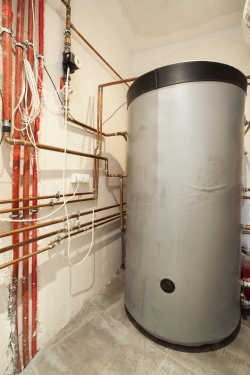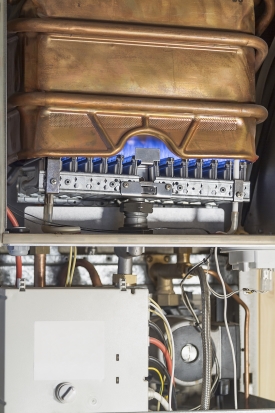- Thermostat set correctly?
- Filter Clean?
- Furnace Power Switch On?
- Circuit Breaker On?
Whether you are in the market to have a boiler installed in your home, need to know what kind of boiler is installed in a home you're looking to purchase, or simply want to find out more about your own boiler, Hot Point Heating & Air Conditioning is here to help. Boiler heating systems come in many different categories and varieties, each with distinguishing characteristics best suited for unique purposes.
 Steam Boiler
Steam BoilerBoth hot water and steam boilers use a heat exchanger as a tool to heat water and distribute it to a piped system connected to radiators around the home. Steam boilers work by utilizing pressure and gravity to deliver hot steam to radiators and cycle cooled condensation back into the boiler to be reheated. The process works as such:
Steam boilers need a pressure relief valve and a low water cutoff. The majority of steam boilers have a manual valve to allow for adding water to the system when necessary. Keep an eye on the water level gauge to keep the water level at its appropriate level. Always keep close attention to your boiler heating system and perform DIY maintenance on your boiler to keep it in good working order.
A "knocking" noise could indicate a malfunction within the system. Contact our boiler repair experts if you have any problems with your steam boiler.
Water boiler heating systems rely on pressure, volume and temperature to provide efficient and safe heating to the radiators in your home. It uses one or a series of pumps to circulate heated water through your home. Here's how water boilers work:
It should be noted that hot water boilers are not the same as hot water heaters. Water heaters heat the water for your shower, dishwasher or tap water. Hot water boilers can be used to heat tap water in a separate tank, but the water for heating the radiators and for heating tap water are kept separate.
 Natural Gas Boiler
Natural Gas BoilerGas boilers are fueled by natural gas, pumped through a gas line running beneath the house via a pipeline from an adjacent road. Rural gas boilers sometimes use propane gas from a large tank placed outside the home, as there is no main line for natural gas in most rural areas.
Natural gas is regulated by a temperature gauge and a thermocouple to minimize fuel usage. The gas is used to keep a pilot light lit, which warms the heating coils in the boiler, passing the heat along to the water in the tank.
Electric boilers do not rely on fossil fuels such as gas or oil to bring heat to your home. Electric boilers remain highly popular because they are extremely efficient and environmentally friendly. There are no exhaust fumes carrying away valuable heat and into the atmosphere. They have no need for a main gas or fuel supply, benefitting rural users. Installation costs are lower, and electric boilers are quieter and more space efficient.
But it's not all gravy. Electric boilers have the following disadvantages:
Oil boilers (sometimes called oil-fired boilers) are water-based heating systems fueled by oil. These are more common in rural areas in the country with more limited access to natural gas. A separate oil tank, often containing heating oil blended with domestic biodiesel, pumps the mixture into your oil boiler to heat the water within and send hot air or water through the piping in your home.
Older oil boilers can be very energy inefficient. If your oil boiler has a natural draft, continuous pilot light or a heavy heat exchanger, it’s probably not very environmentally friendly. While retrofitting is an option, you’ll need to consider replacing the unit entirely. If you need help deciding what’s more cost-efficient for you, the boiler repair professionals at Hot Point Heating & Cooling are always available to answer your questions.
Condensing boilers utilize two separate heat exchangers: one to heat the water before it goes out to the radiators, and another to reheat water returning from the piping in the home. Condensing boilers use the energy potential in exhaust gases to preheat the return water to the boiler. The result is vastly increased energy efficiency over its non-condensing counterpart.
For more information on condensing boilers and their numerous advantages, consult our guide to how condensing boilers work.
Boiler repair professionals at Hot Point Heating & Air Conditioning know your boiler system and how it works. No matter what suspicious knocking, banging or leaking you detect, trust in our HVAC technicians to be on the scene quickly and provide timely repairs.
Our flat rate pricing guarantees you won’t pay a dime past what you’re quoted. You won’t find a more trustworthy HVAC service in southeastern Wisconsin.